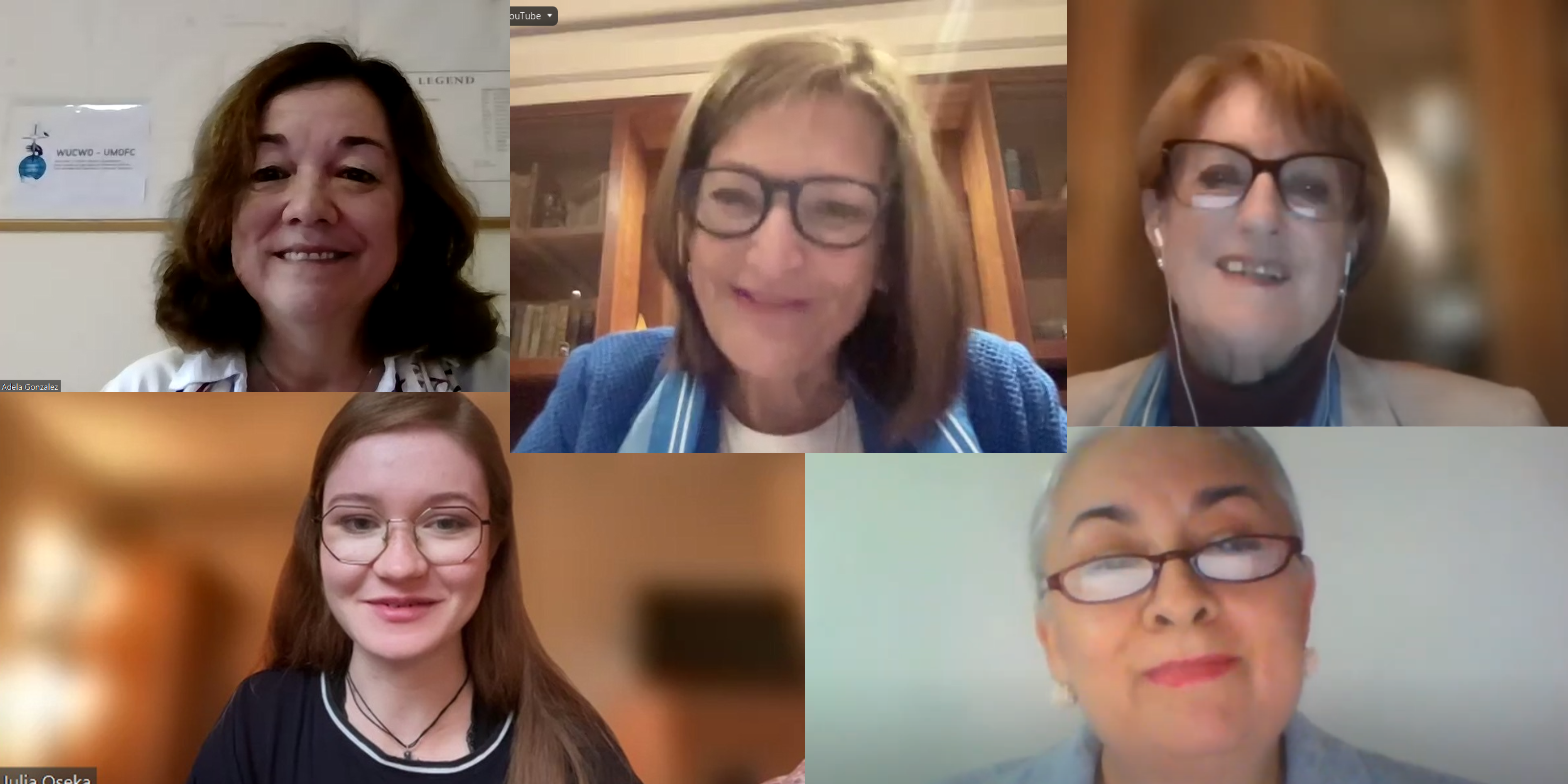+39 0669887260 | info@wucwo.org | Contact us
School for Synodality
Voices and faces on the threshold of the Synod

A few days before the start of the second session of the Synod on Synodality, a webinar was held on 26 September, organised by the World Union of Catholic Women's Organisations (WUCWO), in the framework of the School of Synodality. The webinar counted with the participation of 260 persons from 49 countries. In this webinar, the results of the conversations in the Spirit involving 678 women from 78 countries were presented.
The analysis of these conversations, prepared by the Catholic University of Argentina, will be sent to the Synod Secretariat and shared with the participants of the next Synod session that will take place in October 2024.
During the webinar, Mónica Santamarina, WUCWO’s President General, highlighted the importance of synodal and participatory leadership training, not only for women, but also for clergy and lay men. “Forming and exercising synodal leadership is an important desire that we need to address together. We hope that more scholarship opportunities for women in various parts of the world will also be made available” said the President General.
Outcomes and recommendations from the Conversations in the Spirit
Theological, pastoral and leadership training is one of the recommendations resulting from the conversations in the Spirit. But not only for women. “Updating the formation for priests to be better prepared to connect and collaborate with the laity and in particular with women, and answer to today’s challenges” reads the synthesis.
The other recommendations concern, among others, the following aspects:
- The invisibility of women, especially in Asia and Africa, where they are seen only when their work is required but are hardly ever included in decision-making processes. The word ‘frustration’ was the most commonly heard word when relating these experiences.
- Lack of appreciation of women's contribution: the feeling of being underestimated and undervalued is common, especially at decision-making moments.
- Insufficient recognition of the gifts that women bring to church communities.
Despite the many steps that have been taken in the Church regarding the participation of women, both lay and consecrated, the meeting underlined the importance of continuing to move forward to build “communion and unity in diversity, overcoming exclusion and building a more inclusive community, in which cultural and gender differences are valued”.
The synthesis also highlights some divergences, i.e. issues on which no consensus was found among women. One of these is women's access to ordained ministry.
“Some strongly support the inclusion of women in these roles as a necessary response to the decline of vocations in the clergy and as a sign of justice and equality, while others are sceptical or totally against it”.
Webinar panellists: Julia Oseka, Elisa Delgado Cabrera and Barbara Dowding
Julia Oseka, the youngest Synod mother, 23, a student of physics and theology in the United States and originally from Poland “where I hope to return once I finish my studies”’ she says. “As I sat in that chair, I felt how many women before me have contributed so that today we can be heard. I also felt the inspiration I have received from many women who, for me, are models of leadership in the Church. My experience at the Synod is one of equality: the methodology of the conversation means that everyone, regardless of role, has equal time and equal questions. For some of us, I think it's the first time we have had such an equal experience of dialogue with priests, laity and bishops”.
The WUCWO School of Synodality has trained 253 synod facilitators who, in their countries, have promoted encounters with the method of conversation in the Spirit.
Elisa Delgado Cabrera, Commissioner for Formation of the Mexican Catholic Women's Union, recounts her experience as a synod facilitator: “Being a facilitator for me was an exercise in listening, as I am used to talking. In organising conversations in the Spirit for women from 29 dioceses in Mexico, we witnessed the joy of the people who, through us, felt listened to by the Church without being judged. In the conversations we saw the capacity of each person to be guided by the Spirit, listening deeply to others. Needs for attention and care emerged, but also much hope”.
Barbara Dowding, WUCWO’s Vice President for North America, also engaged in promoting encounters as a facilitator, says: “The Church can best support women in their leadership roles by promoting a culture of active listening, open communication and ongoing formation. For the future, members felt it was essential that the Church continues to promote the unique gifts of women, encouraging their participation at all levels, allowing them to take on more decision-making roles within the Church, and remaining open to the guidance of the Holy Spirit in these endeavours”.
At the end of the meeting, Julia was asked for a wish for the Synod: “I would like each of us to be a visible sign of the invisible grace. There will be a group of students coming to Rome from the United States to listen to the Synod mothers and fathers, to learn about this Synodal Church process: they are excited and curious, if you see them on the street, stop and say hello”.
To watch the recording of the webinar: https://www.youtube.com/watch?v=2pm1UZ_inj0